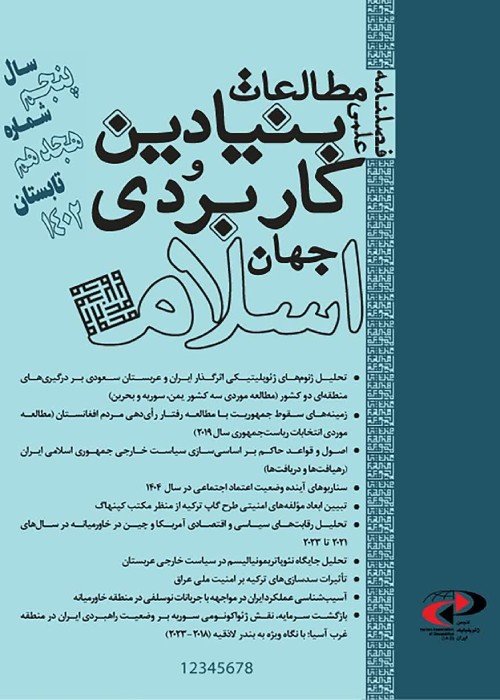The future of politics and security in the Islamic world and Southwest AsiaPacific
In the post-Cold War years, the security environment in the Islamic world has not been very favorable, and the region has witnessed crisis, conflict and geopolitical confrontation. This period has also witnessed the emergence of conflicting identities. The emergence of these conflicting identities has been a function of the action of social forces and their ideological process in regional competition. The result of this process has been the formation of new regional wars and geopolitical instability in the Islamic world. On the other hand, these regional wars themselves have led to an increase in the security and strategic role of the great powers in the regional environment, which in turn has exacerbated the scope of the conflict. In fact, when it comes to new wars in the security environment and geopolitical areas of the Islamic world, it shows that the role of regional actors has significantly increased, and the conflict has become part of the realities of the world's security environment. Islam has become and the future of the Islamic world will be affected by these conflicts and the identification of identity forces in the space of conflict. The main reason is the polarization of political and identity rivalries in the Islamic world. In other words, many actors in the security environment of the Islamic world, including Iran, Saudi Arabia, Turkey and Egypt, have conflicting identity and geopolitical approaches, and in such circumstances, the ground is prepared for the reproduction of domestic, regional and international competition. The great powers will also try to use various mechanisms, including the reproduction of conflicting identities, fragile rivalries, regional wars, and strategic divisions. Therefore, given this fact, the main question is what will be the geopolitical formation of Southwest Asia and the countries of the Islamic world in the future? The argument is that identity, as well as being a correlational factor, will be considered a factor in the spread of social and cultural gaps. In such a situation, conflicts become cultural or quasi-cultural in nature and are linked to structural components. The link between identity and structural components is one of the main factors in the spread of regional crises. The reality is that the structural shaping of the international system and the needs of the global economy will affect the future of politics and the security of the Islamic world. This process will lead to several factors that could affect the geopolitical formation of the Islamic world. These factors include the emergence and proliferation of proxy wars in the Islamic world, the increase in asymmetric threats in the Islamic world, identity erosion wars in the Islamic world, asymmetric mixed wars in the Islamic world, and the transnational coalition of actors in the Islamic world. The confrontation between Saudi Arabia and Egypt with the resistance forces in the Islamic world, the confrontation of the Saudi identity and the Salafi world with Iran, the spread of chaos in the geopolitics of the Islamic world. But the next question is what will be the scenarios of Iran's strategic action in the future of the Islamic world. In this case too, it is argued that Iran's strategic scenarios in the Islamic world will be based on signs of normative balance and trust. continuation of identity conflicts provides the basis for the role of trans-regional actors and turbulent countries in the regional environment. In this regard, it is necessary to mention the mechanisms related to cooperation patterns and scenarios that promote Iran's constructive role in the regional environment. Each of these mechanisms can be considered as part of the security needs of the future of the Islamic world. One of these mechanisms is the need for regional balance in Iran's strategic policy. Another mechanism is Iran's tactical coalition in the Islamic world. Other mechanisms include building trust in Iran's regional policy, avoiding surprises in conditions of ambiguity and uncertainty, regional balance and friction control, countering proxy wars in a strategic environment of uncertainty, preparing to control future regional conflicts, and reproducing the policy of preservation, that noted the current situation, crisis management and chaos control in the face of security ambiguity. The suggestion of such mechanisms is based on research future and this research has tried to achieve them by using scenario writing method. Scenarios and future research emphasize signs of uncertainty. Scenario writing is one of the main mechanisms of future research in regional environments. In other words, it can be said that the scenario is the ideal product of future research, because it is based on a deep and creative approach to the future. A method that carries the risk of encountering astonishing forces. The descriptive scenario is not simple and time-consuming, but the scenarios will depict future probabilities and analyze and recognize complex environmental variables. Scenarios as a way of foresight are tools to help us make far-sighted decisions with high uncertainty that make it possible to integrate medium- and long-term futures with short-term and medium-term strategic planning. A scenario is not only a prediction of a particular future, but also a description of all the probabilities of a possible future. In fact, the scenario is a tool for studying the future by analyzing policies and recognizing the conditions, threats, opportunities, needs and values of the future of the future. choosing the most probable image is not possible, but drawing all possible images of the future. Scenario forecasting is not the future, because in designing scenarios, all possible futures are depicted, some of which may not be realized. In addition, screenwriting based on evidence, data, and information reconstructs and represents past and present events and trends, emphasizing actors and actors and their priorities, strategies, and capabilities.
- حق عضویت دریافتی صرف حمایت از نشریات عضو و نگهداری، تکمیل و توسعه مگیران میشود.
- پرداخت حق اشتراک و دانلود مقالات اجازه بازنشر آن در سایر رسانههای چاپی و دیجیتال را به کاربر نمیدهد.


